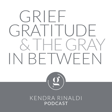
Motherhood, Advocacy, and Navigating Ambiguous Grief with Jessica Fein
Jessica Fein hosts the"I Don't Know How You Do It" podcast, featuring conversations with people whose lives seem unimaginable and who often hearthat very thing. Her writing, which explores grief, resilience, and the unbreakablebonds of family, has appeared in The New York Times, Psychology Today,Newsweek, The Boston Globe, HuffPost, Scary Mommy,and other leading publications. Her work encompasses hope and humor, grit and grace – the tools that make up her personal survival kit. Jessica Fein writes the Grace in Grief column for Psychology Today and is aTEDx Speaker on Grief Literacy. She is the author of Breath Taking: A Memoir of Family, Dreams, and BrokenGenes. InBreath Taking, Jessica Fein takes readers on a powerful journey through the profound joys and heart-wrenching challenges of love and loss. Jessica lost her daughter to rare disease in 2022.
https://www.jessicafeinstories.com
Show Notes
In this heartfelt episode, Kendra interviews Jessica Fein, author of Breath Taking: A Memoir of Family, Dreams, and Broken Genes. Jessica shares her deeply personal journey, touching on themes of loss, resilience, and the powerful lessons she's learned through motherhood and advocacy.
Key themes include:
- Navigating a Rare Diagnosis: Jessica reflects on raising her daughter Dalia, who was diagnosed with MERRF syndrome (Myoclonic Epilepsy with Ragged Red Fibers), an ultra-rare mitochondrial disorder affecting only two in a million people.
- Ambiguous Grief: The emotional complexity of grieving someone who is still alive and how discovering the term brought healing and clarity.
- Adoption Journey: Jessica’s path to becoming a mother through adopting three children from Guatemala and the challenges and joys that shaped her family.
- Family Dynamics and Advocacy: Insights into caregiving partnerships, societal expectations, and the importance of acknowledging emotions openly within the family.
- Healing Through Connection and Legacy: How meaningful gestures, like planting a Dahlia garden in honor of her daughter, and finding community with others facing profound challenges have provided solace and strength.
- Writing as a Tool for Processing Grief: Jessica shares how writing her memoir and essays has been a therapeutic way to process her experiences and connect with others.
Contact Kendra Rinaldi https://www.griefgratitudeandthegrayinbetween.com/


